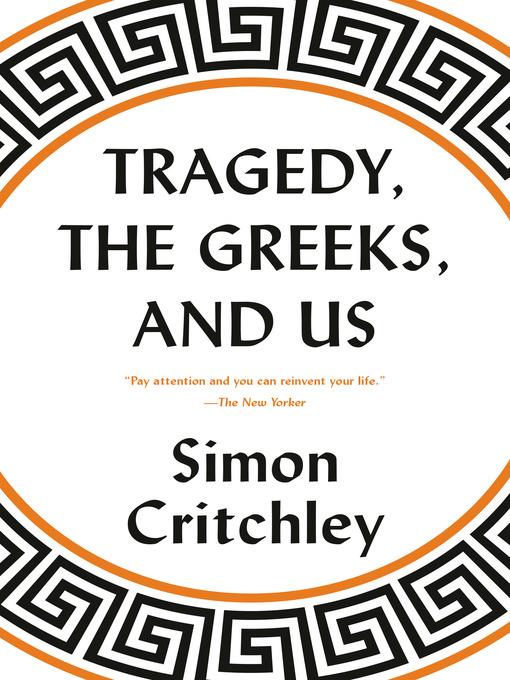
Tragedy, the Greeks, and Us
کتاب های مرتبط
- اطلاعات
- نقد و بررسی
- دیدگاه کاربران
نقد و بررسی

February 1, 2019
A philosopher examines ancient drama for insights into morality, power, and freedom.In an erudite reconsideration of Greek tragedy, philosopher Critchley (Philosophy/New School for Social Research; What We Think About When We Think About Soccer, 2017, etc.) asserts that the ancient Greek past offers "a way of questioning and destabilizing the present." Each generation, he writes, has the responsibility of reinventing classical works in order to rescue whatever "will speak to the present and arrest us momentarily from the irresistible pull of the future." In 61 brief chapters, each an inquiry, commentary, or meditation, Critchley offers close readings that assume readers' familiarity with many of the 31 extant tragedies by Euripides, Sophocles, and Aeschylus; iconic playwrights such as Shakespeare, Beckett, and Brecht; philosophical writings of Plato and Aristotle; and critical works on tragedy by philosophers, theorists, and literary scholars from German idealists and romantics to contemporary writers such as Judith Butler, Terry Eagleton, and Anne Carson. Tragedy, Critchley writes, "poses a most serious threat to that invention we call philosophy" because it presents a "conflictually constituted world defined by ambiguity, duplicity, uncertainty, and unknowability." In tragedy, humans must respond "to demands that exceed autonomy, that flow from the past, disrupt the present, and disable the future." Gods stand as "the placeholder for a force or forces that exceed yet determine and can indeed destroy human agency. The gods are names for powers not under our control." Among many unresolved questions about the impact of tragedy on viewers, the author asks about "the inversion of gender roles" in plays centered on the actions of intelligent, courageous women. In rigidly patriarchal Greek society, young men played these roles, and it is not known if women were among audience members. Male viewers, then, were confronted with displays of women's power as well as overwhelming grief. Were such plays "lifelike," Critchley wonders, ."..or is something more subversive, troubling, and insurrectionary taking place in drama?"For students of Greek drama, a revelatory contemplation of the theater's enduring power.
COPYRIGHT(2019) Kirkus Reviews, ALL RIGHTS RESERVED.

February 25, 2019
New School philosophy professor Critchley (What We Think About When We Think About Soccer) takes on ancient Greek tragedy’s philosophical implications in this dense, demanding study. A self-described “non-classicist,” Critchley finds in the classical form a bracing alternative to his own discipline. If philosophy is rational and sensible, then tragedy plays are ambiguous, “giving voice to what is contradictory about us... and what is limited about us.” Informing readers unfamiliar with classical literature that in ancient Greek plays “tragedy requires some degree of complicity on our part,” he points to the “highest exemplar of tragedy,” Sophocles’ Oedipus the King, in which the protagonist, seeking to defy a prophecy that he will commit patricide and incest, unknowingly commits both. In this way, the play shows how “we both know and don’t know at one and the same time,” and how free will allows people to follow a preordained fate. These aren’t easy ideas, and this book is not one to be read casually. In his acknowledgments, Critchley writes of initially exploring his ideas in lectures and conversations, an exploratory process evident throughout this intelligent, rigorous book. Dedicated readers will have the sense of being at a thoughtful scholar’s side as he works through an intractable intellectual problem.

Starred review from March 1, 2019
What poet Anne Carson sees in a Detroit foundry?a flaming molten core?Critchley finds in ancient Greek tragedy. Such tragedy, Critchley argues, delivers life at its fieriest, enveloping audiences in heart-melting grief as it consumes philosophical clarity and moral certainty. Those who view this drama must confront the profound difficulty of choosing a path of action when surrounded by ambiguity. No wonder that Plato feared the civic effects of tragic poetry and therefore banned it from his utopian Republic. But Critchley detects in Plato's political-metaphysical reasoning?and in other philosophizing about tragedy?a futile attempt to deny contradictions integral to our humanity. In Nietzsche's striking willingness to embrace those contradictions, Critchley finds a perspective on tragedy open to its revelatory and transformative power. Readers feel that power as they probe the dazzling words and tempestuous emotions in the tragedies of Aeschylus, Sophocles, and?above all?Euripides. Plays such as Seven against Thebes, Oedipus, and Electra leave Critchley and his readers shaken by anguish born of violence?and generating it anew. But those who are so shaken, Critchley hopes, can perhaps check our twenty-first-century rush toward a rosy future built of nothing but illusory ideologies and seductive technogadgets. Postmodern philosophy collides with ancient drama, generating the heat of passion, the sparks of illumination.(Reprinted with permission of Booklist, copyright 2019, American Library Association.)

February 1, 2019
Curator of the New York Times's popular philosophy blog, "The Stone," Critchley knows his Greek literature. Here he offers a new perspective on the great works of the ancient playwrights while showing how resonant these works remain today.
Copyright 2018 Library Journal, LLC Used with permission.

























دیدگاه کاربران